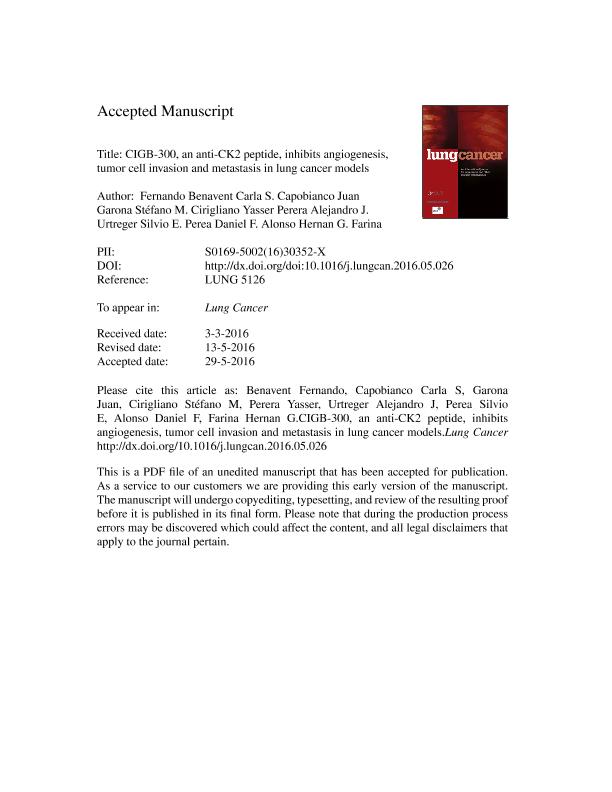Mostrar el registro sencillo del ítem
dc.contributor.author
Benavent Acero, Fernando Rodrigo

dc.contributor.author
Capobianco, Carla Sabrina

dc.contributor.author
Garona, Juan

dc.contributor.author
Cirigliano, Stéfano Martín

dc.contributor.author
Perera, Yasser
dc.contributor.author
Urtreger, Alejandro Jorge

dc.contributor.author
Perea, Silvio E.
dc.contributor.author
Alonso, Daniel Fernando

dc.contributor.author
Farina, Hernán Gabriel

dc.date.available
2019-03-21T15:55:52Z
dc.date.issued
2017-05
dc.identifier.citation
Benavent Acero, Fernando Rodrigo; Capobianco, Carla Sabrina; Garona, Juan; Cirigliano, Stéfano Martín; Perera, Yasser; et al.; CIGB-300, an anti-CK2 peptide, inhibits angiogenesis, tumor cell invasion and metastasis in lung cancer models; Elsevier Ireland; Lung Cancer; 107; 5-2017; 14-21
dc.identifier.issn
0169-5002
dc.identifier.uri
http://hdl.handle.net/11336/72190
dc.description.abstract
Objectives: Casein kinase 2 (CK2) is overexpressed in several types of cancer. It has more than 300 substrates mainly involved in DNA reparation and replication, chromatin remodeling and cellular growth. In recent years CK2 became an interesting target for anticancer drug development. CIGB-300 is a peptidic inhibitor of CK2 activity, designed to bind to the phospho-acceptor domain of CK2 substrates, impairing the correct phosphorylation by the enzyme. The aim of this work was to explore the antitumor effects of this inhibitor in preclinical lung cancer models.
Materials and methods: Human H125 and murine 3LL Lewis lung carcinoma cell lines were used to evaluate the effect of CIGB-300 treatment in vitro. For this purpose, adhesion, migration and invasion capabilities of cancer cells were tested. Proteolytic activity of tumor cell-secreted uPA and MMP after CIGB-300 incubation was also analyzed.
In vivo anticancer efficacy of the peptide was evaluated using experimental and spontaneous lung colonization assays in C57BL/6 mice. Finally, in order to test the effect of CIGB-300 on tumor cell-induced angiogenesis, a modified Matrigel plug assay was conducted.
Results and conclusion: We demonstrate that treatment with low micromolar concentrations of CIGB-300 caused a drastic reduction of adhesion, migration and invasion of lung cancer cells. Reduced invasiveness after CIGB-300 incubation was associated with decreased proteolytic activity of tumor cell-conditioned medium.
In vivo, intravenous administration of CIGB-300 (10 mg/kg) markly decreased lung colonization and metastasis development of 3LL cells. Interestingly, after 5 days of systemic treatment with CIGB-300, tumor cell-driven neovascularization was significantly reduced in comparison to control group. Altogether our data suggest an important role of CK2 in lung tumor development, suggesting a potential use of CIGB-300 as a novel therapeutic agent against lung cancer.
dc.format
application/pdf
dc.language.iso
eng
dc.publisher
Elsevier Ireland

dc.rights
info:eu-repo/semantics/openAccess
dc.rights.uri
https://creativecommons.org/licenses/by-nc-nd/2.5/ar/
dc.subject
Angiogenesis
dc.subject
Cigb-300
dc.subject
Ck2
dc.subject
Lung Cancer
dc.subject
Metastasis
dc.subject.classification
Otras Biotecnologías de la Salud

dc.subject.classification
Biotecnología de la Salud

dc.subject.classification
CIENCIAS MÉDICAS Y DE LA SALUD

dc.title
CIGB-300, an anti-CK2 peptide, inhibits angiogenesis, tumor cell invasion and metastasis in lung cancer models
dc.type
info:eu-repo/semantics/article
dc.type
info:ar-repo/semantics/artículo
dc.type
info:eu-repo/semantics/publishedVersion
dc.date.updated
2019-03-21T14:18:50Z
dc.journal.volume
107
dc.journal.pagination
14-21
dc.journal.pais
Irlanda

dc.journal.ciudad
Shannon
dc.description.fil
Fil: Benavent Acero, Fernando Rodrigo. Consejo Nacional de Investigaciones Científicas y Técnicas; Argentina. Universidad Nacional de Quilmes. Departamento de Ciencia y Tecnología. Laboratorio de Oncología Molecular; Argentina
dc.description.fil
Fil: Capobianco, Carla Sabrina. Consejo Nacional de Investigaciones Científicas y Técnicas; Argentina. Universidad Nacional de Quilmes. Departamento de Ciencia y Tecnología. Laboratorio de Oncología Molecular; Argentina
dc.description.fil
Fil: Garona, Juan. Consejo Nacional de Investigaciones Científicas y Técnicas; Argentina. Universidad Nacional de Quilmes. Departamento de Ciencia y Tecnología. Laboratorio de Oncología Molecular; Argentina
dc.description.fil
Fil: Cirigliano, Stéfano Martín. Consejo Nacional de Investigaciones Científicas y Técnicas; Argentina. Universidad de Buenos Aires. Facultad de Medicina. Instituto de Oncología; Argentina
dc.description.fil
Fil: Perera, Yasser. Centro de Ingeniería Genética y Biotecnología; Cuba
dc.description.fil
Fil: Urtreger, Alejandro Jorge. Consejo Nacional de Investigaciones Científicas y Técnicas; Argentina. Universidad de Buenos Aires. Facultad de Medicina. Instituto de Oncología "Ángel H. Roffo"; Argentina
dc.description.fil
Fil: Perea, Silvio E.. Centro de Ingeniería Genética y Biotecnología; Cuba
dc.description.fil
Fil: Alonso, Daniel Fernando. Consejo Nacional de Investigaciones Científicas y Técnicas; Argentina. Universidad Nacional de Quilmes. Departamento de Ciencia y Tecnología. Laboratorio de Oncología Molecular; Argentina
dc.description.fil
Fil: Farina, Hernán Gabriel. Consejo Nacional de Investigaciones Científicas y Técnicas; Argentina. Universidad Nacional de Quilmes. Departamento de Ciencia y Tecnología. Laboratorio de Oncología Molecular; Argentina
dc.journal.title
Lung Cancer

dc.relation.alternativeid
info:eu-repo/semantics/altIdentifier/url/https://www.sciencedirect.com/science/article/pii/S016950021630352X
dc.relation.alternativeid
info:eu-repo/semantics/altIdentifier/doi/https://doi.org/10.1016/j.lungcan.2016.05.026
Archivos asociados
